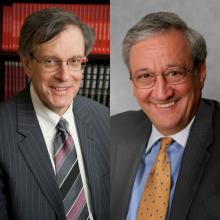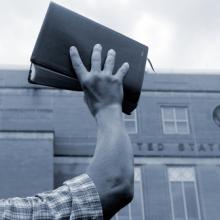Americans United for Separation of Church and State
EXCEPT FOR ABRAHAM LINCOLN and Thomas Jefferson, every president of the United States was or is a professing Christian.
Only in the case of John F. Kennedy, it seems, has a president’s Christian faith counted against him in the opinion of a significant number of citizens, and in Kennedy’s case it was because he was Catholic rather than Protestant. The Christian belief of public officials in any branch of national, state, or local government hardly ever raises concern among the U.S. public. But the opposite is true when it comes to Muslim officials.
Many conservative Americans say they fear that the U.S. will become a nation influenced by Islamic tenets instead of Christian ones. Commentators on Fox News often express alarm about sharia (Islamic law). Jeanine Pirro, host of the network’s Justice with Jeanine Pirro, accused Rep. Ilhan Omar, D-Minn., a Muslim woman of Somali descent, of supporting Islamic rule in the United States. Omar and Rep. Rashida Tlaib of Michigan are the only two Muslim women ever elected to Congress, and two of the three Muslims ever to serve in the U.S. legislature; Twitter users criticized Omar for wearing a hijab and Tlaib for wearing, at her congressional swearing-in, a traditional Palestinian dress called a thobe, made by her mother. Another Fox News host, Pete Hegseth, said that, based on how Tlaib “talked about President Trump having a hate agenda, I could, therefore, look at her and say that she has a Hamas agenda.” The Associated Press had to debunk the claim that Tlaib’s thobe was a “symbol of Hamas terrorists,” a sign that many Americans may have believed it to be true.
The alienation and hate go even further. A Florida Republican politician said in a fundraising email that falsely claimed that Omar worked for the nation of Qatar, “We should hang these traitors where they stand.” Another man called Omar’s office and said he would “put a bullet in her skull.” Following the Jan. 6 insurrection at the U.S. Capitol, when lawmakers were still in the building trying to certify President Joe Biden’s election, Tlaib discussed on the House floor her constant fear due to the death threats she regularly receives.
“I worry,” she said, “every day.”
After a quarter-century, the Rev. Barry Lynn is retiring as head of Americans United for Separation of Church and State.
In court, in congressional hearings, and on cable television, Lynn has led the fight against school-sponsored prayer, religious symbols on public property, and any law that allows government to privilege people of faith.
Since winning the election with strong support from conservative evangelical voters, President Trump has invited their leaders to the White House, and banned government funding for groups that support or perform abortions overseas.
But he has yet to move on one item that many of them care about.
No one has been named to direct the Office of Faith-based and Neighborhood Partnerships, which, since 2001, has linked government with a broad range of religious groups.
The Internal Revenue Service said it will monitor churches and other houses of worship for electioneering in a settlement reached with an atheist group.
The settlement was reached Friday in federal court in Madison, Wis., where the initial lawsuit was filed in 2012 by the Freedom from Religion Foundation, a Wisconsin-based atheist advocacy group that claims 20,000 members nationwide.
The suit alleged the IRS routinely ignored complaints by the FFRF and others about churches promoting political candidates, issues or proposed legislation. As part of their tax-exempt status, churches and other religious groups are prohibited from engaging in partisan political activity.
Serving in the armed forces is one of the most honorable professions one can choose in our society. And putting one’s life on the line in defense of freedom is a sacrifice the rest of us can never repay.
That’s why it saddens us that these very freedoms are being undercut by forces seeking to infuse the military with a very specific version of Christian culture. Leaders from the religious right claim that the religious liberty rights of Christians are under assault in the military. This is simply not true, and the implication is an insult to people around the globe and here at home who truly do face persecution for their faith.
What is true is that military life is different than civilian life. A chain of command impacts every aspect of a service member’s life; because of that, safeguards must be in place to ensure that no member of the military is being coerced into religious practices unwillingly.
The Supreme Court agreed Monday to consider whether prayers can be offered at government meetings — a practice that’s been common in Congress and throughout the states for more than two centuries.
The religious expression case, which comes to the court from the town of Greece, N.Y., focuses on the first 10 words of the First Amendment, ratified in 1791: “Congress shall make no law respecting an establishment of religion.”
That Establishment Clause was violated, the 2nd U.S. Circuit Court of Appeals ruled last year, when the Greece Town Board repeatedly used Christian clergy to conduct prayers at the start of its public meetings. The decision created a rift with other appeals courts that have upheld prayer at public meetings, prompting the justices to step in.





